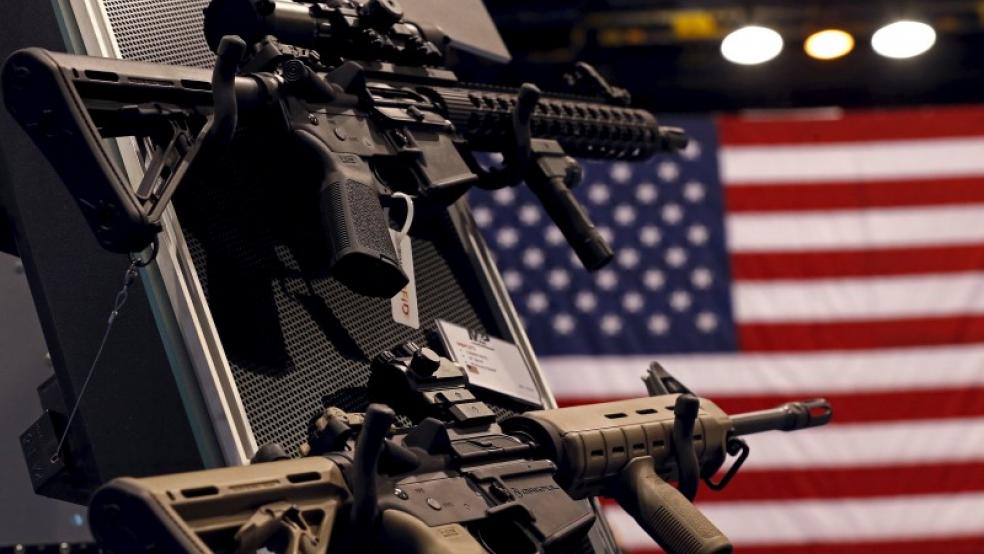President Obama’s new gun rules are so insignificant that even the NRA could find little to protest. What does that tell you?
After all the hype about Obama’s determination to boldly and unilaterally confront the plague of shootings in the U.S., the president settled for minor adjustments in how to define those required to register as arms dealers, and some common sense directives making more mental health records available to background checkers. The idea is to expand the number of buyers who have to be vetted and also to beef up the inquiries already performed under existing rules.
Obama fans are doubtless let down that the president didn’t go further – prohibiting sales to those on the “no-fly” list or banning large capacity magazines, for instance. The anti-gun brigade will also be disappointed that the president didn’t require universal background checks and eliminate altogether the so-called “gun show” loophole. They shouldn’t be.
Related: Obama: Gun Control Won’t Happen During My Presidency
Here’s why: the shooters in San Bernardino, at Umpqua Community College, in Roanoke, Virginia, Charleston, South Carolina and Lafayette Louisiana -- the most recent “mass” killings -- all obtained their weapons from federally licensed gun dealers. All had passed the requisite background checks.
Some of the shooters should have been barred from purchasing guns. Dylann Roof, who murdered nine African Americans people in a church, should have been turned down since he had admitted to possessing drugs, but the FBI failed to follow through on the investigation. John Houser, who shot up a movie theater in Lafayette, Louisiana, had a history of mental illness and domestic abuse. He should not have been allowed to purchase a firearm, and indeed had been denied a concealed weapon permit in his home state. But in neighboring Alabama, he got one anyway.
These examples are not the exceptions – they are the rule. Access to guns by unfit people has almost nothing to do with the “gun show loophole,” which turns out to be another one of those convenient myths that has driven Obama policy--like the false suggestion that a goodly share of our prison population are innocent victims of overly-harsh drug laws.
Related: Shares of Gun Makers Soar as Obama Tightens Firearm Rules
After the Sandy Hook tragedy, President Obama convened a group overseen by Vice President Joe Biden to study gun control issues. In a 2013 speech, the president proposed various policies meant to check such killings, including expanding background checks to private sales of firearms. He noted that any sales through federally licensed vendors require background checks to eliminate those with a criminal history or mental health issues, but also claimed, “It’s hard to enforce that law when as many as 40 percent of all gun purchases are conducted without a background check.”
This assertion was debunked by FactCheck, which points out that the dubious 40 percent statistic emerged from a 1994 telephone survey of only 251 individuals. The author of that study told Politifact that he has “no idea” if that number is valid; Biden takes pains when discussing the topic to say the figure may be incorrect. Other analysts cite 4% as a more accurate share of gun sales through unlicensed dealers, given that a large number of the people surveyed said they had received guns from friends or relatives.
A 2001 survey of state and federal prisoners discovered that less than one percent had bought their weapons at a gun show. Another study, of inmates of the Cook County jail, claimed that 70 percent of those locked up had acquired their weapons from friends or gang members; another favorite source was “straw” purchases made by someone capable of passing the background check. Only two had actually had actually bought a gun at a store.
Related: Here’s Why the Good Guy with the Gun Always Gets Killed
Keeping guns out of the hands of people who should not have them is essential. To that end, the president is working to make mental health records more readily available to those who conduct background checks, and adding to related law enforcement resources. He should also demand that officials crack down on dishonest licensed dealers, only 8 percent of whom sell a majority of the guns used in crimes. But, as one ATF official is quoted as saying, "Let's be honest. If someone wants a gun, it's obvious the person will not have difficulty buying a gun, either legally or through the extensive United States black market."
Meanwhile, while the president decries “mass killings,” which claimed 475 lives in 2015, thousands continue to die from guns in cities like Chicago, where 442 were shot to death in 2015, Baltimore (301) and in New York, where more than 300 were murdered. The White House has discouraged law enforcement officials in those cities from aggressive policing tactics, such as “stop & frisk,” which in 2011 allowed cops in New York City to confiscate more than 800 guns.
Last year in New York, fewer than 400 guns were recovered. What does more to reduce gun violence? Taking away weapons from criminals, or adjusting background checks for gun buyers? We shall see.
A CNN/ORC poll in mid-December shows that a majority of the country (51 percent) opposes stricter gun laws while only 48 percent favors tightening the rules – a change from earlier surveys, reflecting increased nervousness about terrorism in the wake of the San Bernardino shootings. The timidity of President Obama’s proposals may reflect concerns that he is out of step with the country. On the other hand, voter disapproval has not torpedoed his unpopular measures on immigration, the Iran nuke deal or healthcare. Why should gun control be any different?






